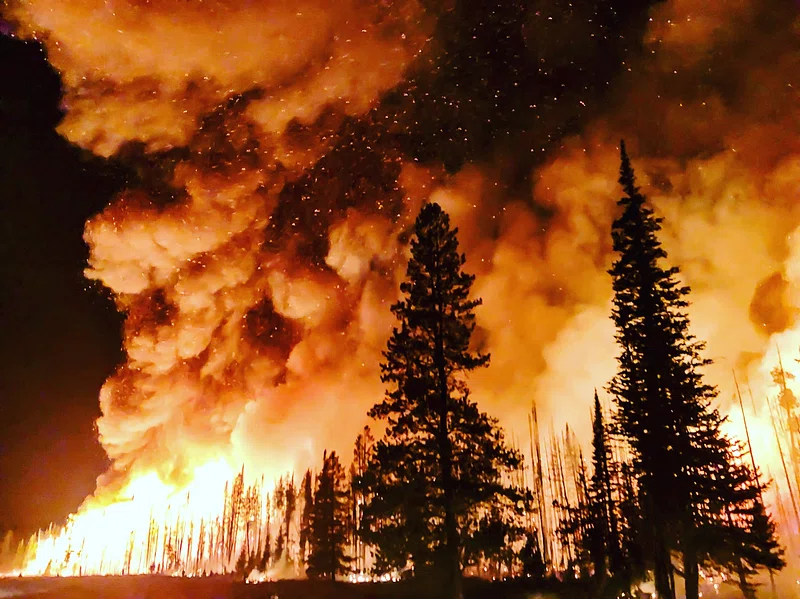‘Five-Alarm Fire’ as Global Temps Breach 2°C Threshold

Original article by OLIVIA ROSANE republished from Common Dreams under Creative Commons (CC BY-NC-ND 3.0).
While scientists were quick to point out that this was just a daily anomaly, not a permanent shift, it is a “canary in the coalmine” that “underscores the urgency of tackling greenhouse gas emissions.”
Global temperatures surpassed 2°C above preindustrial levels for the first time Friday, according to preliminary data from the European Union’s Copernicus Climate Change Service.
The European Centre for Medium-Range Weather Forecasts’ ERA5 data set showed global service air temperatures rising 2.07°C above the 1850-1900 average on Friday and 2.06°C above that average on Saturday, the service said.
“This is a five-alarm fire for humanity,” the group Climate Defiance tweeted in response to the figures.
In the 2015 Paris agreement, world leaders set out to keep warming to “well-below” 2°C above preindustrial levels. Allowing warming to breach that point increases several climate risks, according to the Intergovernmental Panel on Climate Change (IPCC): 2°C of warming compared with 1.5°C would raise sea levels by an additional 0.1 meters by 2100, destroy 99% of coral reefs instead of 70% to 90%, and expose several hundred million more people to poverty and climate-related hazards by 2050.
Friday’s 2°C breach was first noted by Copernicus Climate Change Service deputy director Samantha Burgess on social media Sunday. She said the day was also 1.17°C above the 1991-2020 average, making it the warmest November 17 on record.
Scientists were quick to point out that this doesn’t mean global heating has breached the 2°C threshold long-term.
“The 1.5°C and 2°C warming thresholds have been defined in terms of the trend line,” University of Pennsylvania climate scientist Michael Mann tweeted. “Not individual years, let alone months, weeks, or days (the shorter the time period, the larger the random fluctuations). Those who imply otherwise are misleading you.”
Richard Allan, professor of climate science at the University of Reading in the U.K., told CNN that it was “entirely expected that single days will surpass 2°C above preindustrial well before the actual 2°C target is breached over many years.”
“We are blowing past warning signs with wild abandon. We are approaching the precipice and flooring the gas.”
That said, the reading was a “canary in the coalmine” that “underscores the urgency of tackling greenhouse gas emissions,” Allan said.
It also comes in a year of dropping canaries: The 12 months from November 2022 to October 2023 were the 12 hottest on record, according to a Climate Central analysis. 2023 saw the hottest Northern Hemisphere summer on record, the hottest month in July, and is likely to be the hottest year not just since record-keeping began, but in the last 125,000 years. And it’s not just numbers. The record-breaking temperatures fueled deadly heatwaves, wildfires, and floods around the world.
“The indicators are flashing red,” Climate Defiance wrote. “The planet’s vital signs are clear. Humanity is on life support. With the El Niño cycle just beginning, this 2°C breach sadly represents not a climax but a small taste of what is to come.”
“This is happening faster than expected,” the group continued. “We are blowing past warning signs with wild abandon. We are approaching the precipice and flooring the gas. This is madness. Utter madness.”
The 2°C breach comes a little less than two weeks from the start of the next United Nations Climate Change Conference in the United Arab Emirates. A recent report from U.N. Climate Change found that national plans were still incompatible with limiting warming to 1.5°C and that world leaders must take “bold strides forward” at the conference “to get on track.” More than 650 scientists have signed a letter to President Joe Biden urging him to back a fossil-fuel phaseout at the talks.
“It’s just one day (so far) above 2°C, but it highlights again that the world is approaching the limits set out by the Paris Agreement,” IPCC scientist Ed Hawkins tweeted. “We already have many of the solutions to rapidly reduce emissions and halt the rise in global temperatures. We just need to choose to use them.”
Original article by OLIVIA ROSANE republished from Common Dreams under Creative Commons (CC BY-NC-ND 3.0).
- In ‘Stern Warning Sign,’ Ocean And Air Temps Break May And June Records ›
- ‘Terrifying’: Scientists Raise Alarm Over Unprecedented Global Ocean Heat ›
- Death Valley Expected To Record Highest Temp Ever On Earth As Climate Crisis Roars ›
- ‘Terrifying’: Tuesday Was Hottest Day Ever, Breaking Record Set Just 24 Hours Earlier ›
- It’s Official, Say NOAA And NASA: This June Was The Hottest Ever Recorded On Earth ›
- Global Temps Not Just Off The Chart, But Off The Wall The Chart Is Tacked To ›